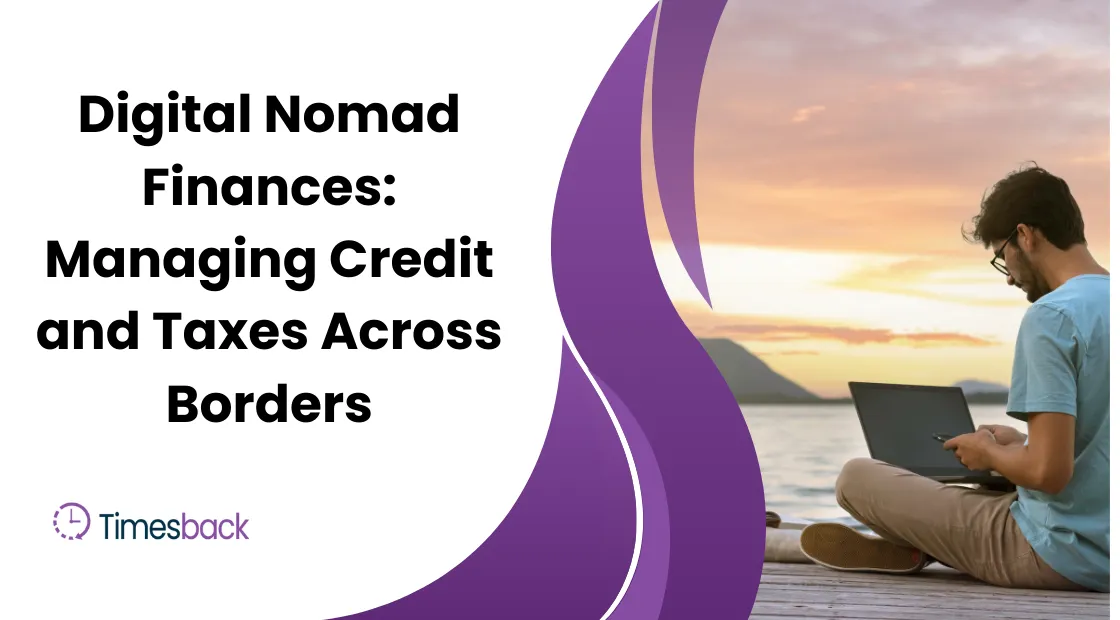Digital Nomad Finances: Mastering Credit and Taxes Across Borders

The life of a digital nomad offers freedom, adventure, and flexibility—but managing digital nomad finances can be a labyrinth of complexities.
Anúncios
From fluctuating exchange rates to multi-jurisdictional tax obligations, remote workers must navigate financial challenges that traditional employees rarely face.
A 2023 study by MBO Partners revealed that over 17 million Americans now identify as digital nomads, highlighting the growing need for smarter cross-border financial strategies.
In this evolving landscape, understanding local laws and financial systems is crucial for maintaining compliance and optimizing your financial health.
Anúncios
Digital nomads often find themselves in countries with vastly different economic conditions, making it essential to adapt their financial strategies accordingly.
As the digital nomad lifestyle continues to gain popularity, resources and communities are emerging to support individuals in navigating these complexities.
This guide explores actionable insights for optimizing credit, minimizing tax burdens, and maintaining financial stability while living abroad.
The Credit Conundrum: Building and Maintaining a Global Financial Profile
For digital nomads, creditworthiness doesn’t always travel well.
Traditional banks rely on localized data, meaning your excellent credit score in one country may be invisible elsewhere.
Here’s how to stay ahead:
1. Choose a Nomad-Friendly Bank
Neobanks like Revolut, Wise, and N26 offer multi-currency accounts, low foreign transaction fees, and debit cards accepted worldwide.
These platforms often provide virtual cards for secure online purchases—essential for freelancers paying SaaS tools or client subscriptions.
Additionally, many neobanks offer budgeting tools and insights to help manage your finances effectively while on the move.
These features can help you track spending and set financial goals, ensuring you stay on top of your budget, no matter where you are.
2. Leverage Travel Credit Cards
Cards like Chase Sapphire Preferred or Capital One Venture Rewards offer no foreign transaction fees, airport lounge access, and points redeemable for flights or accommodations.
Paying off balances in full each month avoids currency-driven debt spikes.
Moreover, the rewards earned can significantly offset travel costs, making them a valuable tool for frequent travelers.
Utilizing these credit cards wisely can also help build your credit history, which is beneficial when applying for loans or renting property abroad.
3. Establish Local Credit (When Necessary)
If staying long-term in a country, consider a local bank account or secured credit card.
Some nations (like Spain) allow non-residents to build credit, while others (like Japan) require residency.
Establishing local credit can provide access to better financial products and lower interest rates, enhancing your financial flexibility.
Being proactive in building local credit can also help you in emergencies, such as needing a loan for unexpected travel or expenses.
Table 1: Best Financial Tools for Digital Nomads
| Service | Key Benefit | Best For |
|---|---|---|
| Wise | Low-cost currency exchange | Freelancers paid in multiple currencies |
| Revolut | Fee-free ATM withdrawals | Frequent travelers |
| Charles Schwab | Reimbursed ATM fees worldwide | US-based nomads |
Tax Strategies: Avoiding Pitfalls and Maximizing Savings
Tax obligations don’t vanish when you leave your home country.
The IRS, for example, taxes US citizens on worldwide income, while other nations impose residency-based rules.
Here’s how to stay compliant—and keep more of your earnings.
1. Understand Tax Residency Rules
Countries determine tax liability based on physical presence (e.g., 183+ days/year) or economic ties.
Portugal’s NHR program offers a 10-year tax break for foreign-sourced income, while Estonia’s e-Residency enables EU business registration without physical presence.
Being aware of these rules can help you avoid unexpected tax liabilities and penalties.
Additionally, staying informed about changes in tax laws in your host country is essential, as these can affect your financial planning.
+ The Ultimate Guide to Credit Management for a Debt-Free Life
2. Leverage Double Taxation Agreements (DTAs)
Over 3,000 DTAs exist globally to prevent paying taxes twice on the same income.
For instance, a US freelancer in Germany may offset German taxes against US liabilities.
Understanding these agreements is essential for optimizing your tax strategy and ensuring compliance across borders.
Moreover, consulting with a tax professional who specializes in international taxation can provide personalized advice and strategies tailored to your situation.
3. Consider the "Feet on Ground" Approach
Spending less than 183 days in any single country can help avoid tax residency.
However, "permanent establishment" laws may still apply if you work for local clients.
It's crucial to keep detailed records of your travels and work engagements to substantiate your tax residency claims.
Additionally, documenting your income sources can help clarify your tax obligations and protect you in case of audits or disputes with tax authorities.

Table 2: Tax-Friendly Countries for Digital Nomads
| Country | Key Benefit | Consideration |
|---|---|---|
| Portugal | NHR tax regime (0% on foreign income) | Must spend 183+ days/year |
| UAE | 0% income tax | Requires residency visa |
| Georgia | 1% tax for freelancers | Limited banking options |
Hidden Costs: Exchange Rates, Inflation, and Emergency Funds
While digital nomad finances often focus on income and taxes, hidden costs can derail budgets.
Currency fluctuations, for example, may slash earnings when converting USD to Argentine pesos.
Inflation in countries like Turkey (54.8% in 2023) can also erode purchasing power.
Moreover, local costs of living can vary dramatically, impacting your overall financial strategy.
Understanding these hidden costs can help you budget more effectively and avoid financial pitfalls.
Setting aside a portion of your income for unexpected expenses is also a smart strategy to maintain financial stability.
Solutions:
- Hedge against currency risk with Wise or Revolut’s rate alerts.
- Maintain an emergency fund in a stable currency (USD, EUR, or GBP).
- Use inflation-resistant investments like gold ETFs or global index funds.
Additionally, consider diversifying your investments across different asset classes to mitigate risk.
Regularly reviewing your budget and adjusting for local economic conditions can also help you stay financially agile.
++ Credit Card Fraud: How to Protect Yourself from Scams
The Future of Nomad Finance: Crypto, DeFi, and Global Payroll
Blockchain and decentralized finance (DeFi) are reshaping digital nomad finances.
Stablecoins like USDC offer near-instant, low-cost transfers, while platforms like Bitwage facilitate crypto payroll.
However, regulatory uncertainty remains—El Salvador’s Bitcoin adoption contrasts with the EU’s strict MiCA framework.
As the landscape evolves, staying informed about regulatory changes is crucial for digital nomads.
Adopting new financial technologies can provide significant advantages, but they also come with risks that need to be managed.
Moreover, understanding the potential tax implications of using cryptocurrencies is essential to avoid compliance issues.
Key Takeaway:
Diversify income streams, stay agile with regulations, and always consult a cross-border tax specialist.
For more insights on cryptocurrency and its implications for digital nomads, check out CoinDesk.

Final Thoughts
Mastering digital nomad finances requires adaptability, research, and proactive planning.
Whether optimizing credit, minimizing taxes, or hedging against inflation, the right strategies ensure financial stability—wherever your journey takes you.
By staying informed and leveraging modern tools, digital nomads can turn financial challenges into opportunities for growth.
Building a robust financial foundation will empower you to embrace the freedom of the nomadic lifestyle fully.
As the world continues to change, those who adapt their financial strategies will thrive in the ever-evolving landscape of remote work.
Maintaining a strong network of fellow nomads can also provide valuable support and resources as you navigate the complexities of international finances.
Ultimately, the journey of a digital nomad is not just about travel; it’s about crafting a sustainable and fulfilling lifestyle through smart financial choices.
